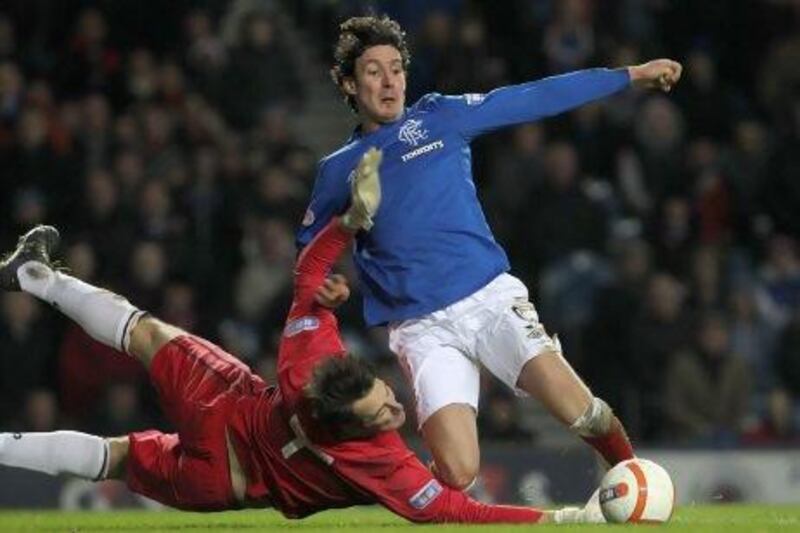You have to be careful what say when you're a footballer, though I had sympathy for the Rangers striker Francisco Sandaza, who was dismissed by his club this week for speaking to an agent about his plans next season. Apart from praising Rangers fans and the club, he revealed his current salary and that he'd like to play in the United States. The "agent" was actually a Celtic-supporting taxi driver who put the prank call on the Internet.
Aside from being hoaxed, the player did nothing wrong. Footballers speak about their future all the time. It's called sounding out.
What's wrong with that? Don't you? If someone called you and offered you the chance to work in America on good money, would you hang up or listen to what they had to say?
I wasn't hoaxed – unless playing me up front with Dwight Yorke, Teddy Sheringham and Ole Gunnar Solskjaer was someone's idea of an elaborate joke which backfired – but then I was always cautious about what I told people. It was partly because if I said anything of interest then it would get around, partly because my plans were nobody else's business. And had I heeded all the advice I was given, I would have gone crazy.
When you play football for a big club, some think you're public property and that you should listen to their words of wisdom. I was once approached at the school gates by another parent who wanted to analyse where he thought my game was going wrong. I didn't realise it was going wrong, but he told me that I needed to relax more in front of goal. I smiled and thanked him for his advice. I don't know what his job was, but I was tempted to find out and start offering advice.
My job was played out in public, however, and people were entitled to have opinions. They paid money to watch their teams, they had passion for those teams and I admired that, though I didn't always relay instructions to Sir Alex Ferguson – such as when a stranger who stopped me in a service station suggested I should tell Ferguson to switch around his midfield.
Fans think they know what's best for their team, but they only see things from their biased point of view. They see things with the benefit of hindsight and they don't know a lot of what goes on behind the scenes. That's why the subject of loyalty is a tricky one, because it doesn't exist.
There are rare examples of one-club men, such as Ryan Giggs or Paul Scholes, Steven Gerrard and a few Barcelona players. A player may set out with every intention of remaining loyal to his team, but it's not always his choosing if he ends up moving on.
I was accused of not being loyal to Newcastle United. Here's what happened. I signed a big contract, in July, my "loyalty" for another four years. By December, the manager decided that his team were too one-dimensional and that he could sell me for a lot of money and buy two different types of strikers for the same amount of money. We had an argument, word went out that I was up for sale and I left the club.
Was that a lack of loyalty?
Clubs often like to cash in on their best players and the player has very little say in the deal and ends up doing what he's told. Did Andrea Pirlo want to leave AC Milan? I don't think so, but they called that one wrong.
Loyalty to a club doesn't really exist. You play for the best club you can and make sure that you are on the pitch rather than sitting on the bench robbing a living. You earn as much as you can in a short career (though money shouldn't be an obsession), you do as well as you can and hope for the best from then on. You then cherish the memories of playing for those clubs and hope that fans share them. I get lots of messages from Bristol City fans who remember me with affection from when I played there over 20 years ago.
That's the deal. You're more likely to be loyal to an individual than a club, a manager who has looked after you, for instance. Fans demanding loyalty are usually wrong, but players can help themselves. If they kiss the badge of their shirt, then they're sending a message which can be misinterpreted and make them look foolish when they move a month later.
Or there could be another way. Sandaza didn't make it to America, but I'm currently watching NBA in Miami. Trading and draft systems are the norm in American sports, and players have next to no choice where they go. There are no transfer fees, no tapping up and absolutely no concept of loyalty. At least I was "sent" to Manchester United, it could have been far worse.
Andrew Cole's column is written with the assistance of European football correspondent Andy Mitten.
Follow us
[ @SprtNationalUAE ]





